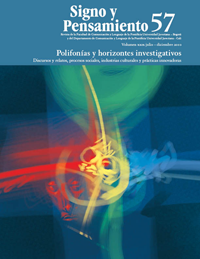Abstract
¿Does tv today offer its audiences what they want to see or rather it offers the products considered most profitable? ¿Should we resort to ethics in order for them to offer quality products? Mass media is in the hands of huge communication groups which in turn have their own political and ideological bonds, and the fight among them in order to get the attention of the audience is tv’s driving force. Nowadays, rather than speaking of ‘information society’ we need to speak of an “entertainment society”. Power is not so much the power of doing, i.e. political power, but rather the power of telling, the power to narrate, the power of the media.
Aparici, R. (coord). (1996), La revolución de los medios audiovisuales: educación y nuevas tecnologías, Madrid, Ediciones de La Torre.
Aparici, R. y Marí Sáez, V. M. (2003), Cultura popular, industrias culturales y ciberespacio, Madrid, UNED.
Área Moreira, M. (2004), Los medios y las tecnologías de la Educación, Madrid, Psicología Pirámide.
— (2005), La educación en el laberinto tecnológico. De la escritura a las máquinas digitales, Barcelona, Octaedro-EUB.
Beltrán de Mena, R. (1988), Información y comunicación. Los medios y su aplicación didáctica, Barcelona, Gustavo Gili.
Berger, J. (1973), Modos de ver, Barcelona, Gustavo Gili.
Bourdieu, P. (1996), “Sobre la televisión” [en línea], disponible en http://www.paralibros.com/ libros/basicos/l08bourd.htm, recuperado: 27 de agosto de 2010.
Campuzano Ruiz, A. (1992), Etnologías audiovisuales y educación. Una visión desde la práctica, Madrid, Akal.
Castells, M. (ed.) (2006), La sociedad red: una visión global, Madrid, Alianza Editorial.
Cebrián Herreros, M. (2005), Información multimedia. Soportes, lenguaje y aplicaciones empresariales, Madrid, Prentice Hall.
Sader, E. (2008, 10 de julio), “Apartes de la presentación de la revista Crítica y Emancipación (clacso)”, En: La Jornada, México d.f. Disponible en: http://www.jornada.unam.mx/2008/07/10/index.php ?section=politica&article=014n1pol, recuperado: 25 de agosto de 2010.
Company, J. M. (1987), El trazo de la letra en la imagen: texto literario y texto fílmico, Madrid, Cátedra.
Dick, E. (1987), Sings of Success: Report of the Media Education Development Program, Glasgow, Scotthish Film Council.
Eco, U. (1968), Apocalípticos e integrados ante la cultura de masas, Barcelona, Lumen. Ferrés, J. (1994), Televisión y educación, Barcelona, Paidós.
Giacomoantonio, A. (1979), La enseñanza audiovisual. Metodología didáctica, Barcelona, Gustavo Gili.
Goodwin, A. (1978), Manual de medios audiovisuales para la educación, Madrid, Paraninfo.
Greenaway, P. (1991), Taeching Visual Media, Jacaranda, Brisbane. Gubern, R. (2004), Máscaras de la ficción, Barcelona, Anagrama.
Gutiérrez, F. (1976), El lenguaje total. Pedagogía de los medios de comunicación, Buenos Aires, Humanitas.
Infoamérica (2010), “Pierre Bourdieu (1930-2002) Perfil biográfico y académico”, [en línea], disponible en http://www.infoamerica.org/teoria/bourdieu1. htm, recuperado: 27 de agosto de 2010.
León, B. (coord.), (2009), Telerrealidad: el mundo tras el cristal. Madrid, Comunicación Social.
Masterman, L. (1985), Teaching the Media, Londres, Comedia.
Martín, M. (1987), Semiología de la imagen y pedagogía, Madrid, Narcea.
Martín-Barbero, J. y Rey, G. (1999), Los ejercicios del ver. La hegemonía audiovisual y la ficción televisiva, Madrid, Gedisa.
Morin, E. (diciembre, 2002), “Diálogos sobre ética y desarrollo” [En línea], entrevista realizada por: Carrizo, L. Disponible en: http://www. scribd.com/doc/25265811/ETICA-ConEdgar-Morin-Dioalogos-sobre-Etica-y-Desrrollo, recuperado: 27 de agosto de 2010.
Platón (2010), Carta vii [En línea], disponible en: http://www.scribd.com/doc/22246802/ Platon-Carta-vii, recuperado: 27 de agosto de 2010.
Rodríguez Diéguez, J. L. (1978), Las funciones de la imagen en la enseñanza, Barcelona, Gustavo Gili.
Romano, V. (2002), La formación de la mentalidad sumisa, Madrid, Endymion.
Salinas, J.; Aguaded, J. I., y Cabero, J. (2004), Tecnologías para la educación. Diseño, producción y evaluación de medios para la formación docente, Madrid, Psicología y Educación, Alianza Editorial.
Tecglen, H. (2000, 17 de mayo), “El Defensor del lector” en: El País (Madríd, España), pág. 16.
Traffel, J. (1986), Presente y futuro del audiovisual, Buenos Aires, Kapeluszz.
Universidad de Buenos Aires (2010), “Pierre Bourdieu. Cátedra Rubinich”, [en línea], http:// www.catedras.fsoc.uba.ar/rubinich/biblioteca/biografias/bio_bourd.htm, recuperado: 27 de agosto de 2010.
Vallet, A. (1980) El lenguaje total. Barcelona, Edelvives.
Verdú, V. (2003), El estilo del mundo, Barcelona, Anagrama.
This journal is registered under a Creative Commons Attribution 4.0 International Public License. Thus, this work may be reproduced, distributed, and publicly shared in digital format, as long as the names of the authors and Pontificia Universidad Javeriana are acknowledged. Others are allowed to quote, adapt, transform, auto-archive, republish, and create based on this material, for any purpose (even commercial ones), provided the authorship is duly acknowledged, a link to the original work is provided, and it is specified if changes have been made. Pontificia Universidad Javeriana does not hold the rights of published works and the authors are solely responsible for the contents of their works; they keep the moral, intellectual, privacy, and publicity rights.
Approving the intervention of the work (review, copy-editing, translation, layout) and the following outreach, are granted through an use license and not through an assignment of rights. This means the journal and Pontificia Universidad Javeriana cannot be held responsible for any ethical malpractice by the authors. As a consequence of the protection granted by the use license, the journal is not required to publish recantations or modify information already published, unless the errata stems from the editorial management process. Publishing contents in this journal does not generate royalties for contributors.


